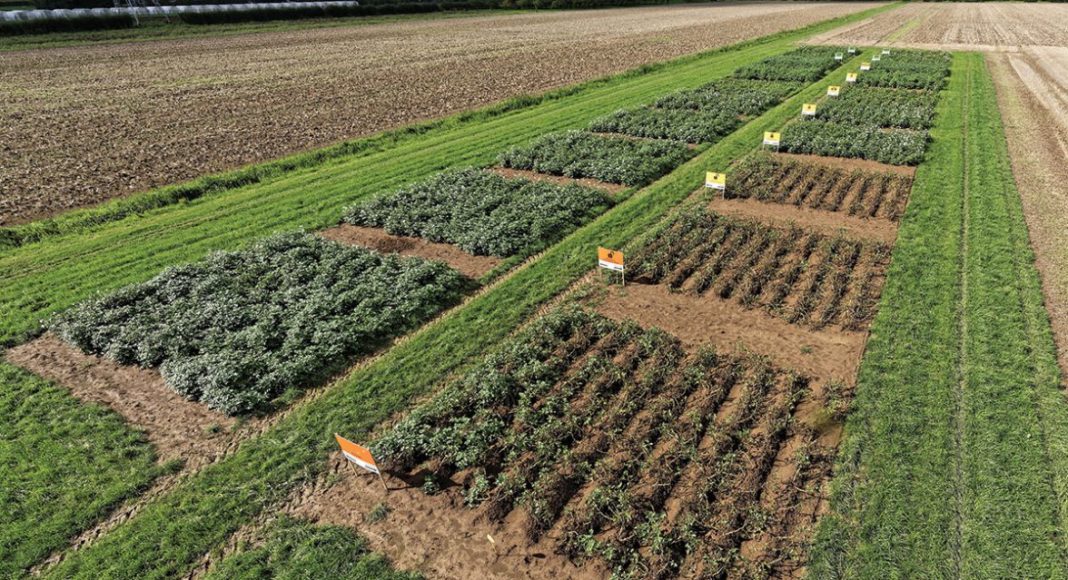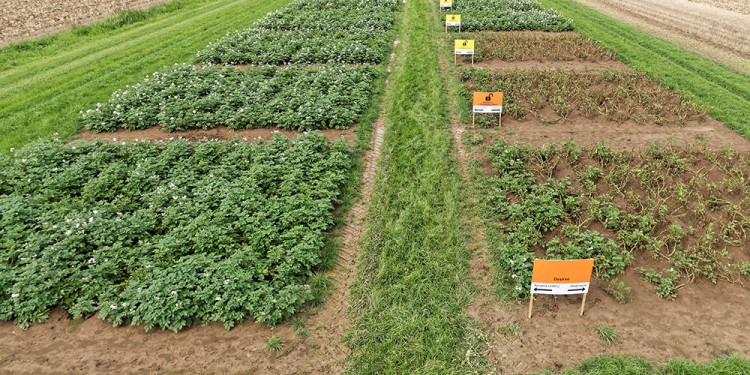RESEARCH RESULTS OF DEMO FIELDS PROMISING – ORGANIC SECTOR WANTS TO SWITCH 100% TO ROBUST VARIETIES
The robust potato varieties grown on 36 demo fields in Flevoland have withstood the Phytophthora year well, according to the research results presented today at growers’ meeting Robuste Varieties. Due to the wet year, the potato crop was affected by the fungal disease. The robust varieties withstood the infection well, because they were not infected or were infected only later, according to the results. Because the robust potato varieties are resistant to phytophthora, they do not need to be sprayed with chemical or synthetic pesticides. As a result of the results, the organic sector wants to switch completely to robust potato varieties, in order to limit damage caused by the fungus as much as possible.

Since the start of the robust potato covenant in 2018, three demo fields have been set up every year to demonstrate and monitor the biologically robust varieties. This year there were a total of 36 varieties in the fields in Dinteloord, Zeewolde and Kollumerwaard. The combined results from the three fields clearly show that the susceptible varieties get sick first and only later the singular resistant varieties and finally the multiple resistant variety.
“The general picture that we can get from the research is that the robust varieties do indeed delay infection. That can make a huge difference for the grower, given the limitation of damage to his crop,” says Geert Kessel, researcher at Wageningen University & Research.
In 2018, 28 parties signed the covenant “Accelerated transition to robust potato varieties”, initiated by Bionext. As a result, the Netherlands was the first country to take major steps towards robust varieties. Countries around us are also investigating the use of the new varieties. Meanwhile, Belgium and the United Kingdom have also signed covenants. By allowing more countries to connect to robust varieties, growers will have more certainty about the yield of robust varieties due to greater demand. This further stimulates the development of robust varieties. During the Bioknowledge Week (10-14 January 2022), both countries will explain their covenant ( webinar on January 11 ).

- Distant cousins of cultivated potato may hold the key to unlocking new sources of resistance to the tuber crop’s most devastating disease, late blight. That’s the hope of a team of Agricultural Research Service (ARS) scientists, who conducted laboratory trials in which they exposed the leaves of 72 different species of wild potato to spores of the late blight pathogen Phytophthora infestans—the same culprit that triggered the Irish Potato Famine of the 1840s.
- Late blight remains a worldwide threat today to not only potato, but also tomato crops, inflicting an estimated $6.7 billion annually in yield losses and control costs. In susceptible varieties, the fungus-like pathogen causes dark lesions and other disease symptoms that rapidly destroy the plant’s leaves, stem, fruit or tubers, noted Dennis Halterman, a plant geneticist with the ARS Vegetable Crops Research Unit in Madison, Wisconsin.
- There, Halterman specializes in the genetic “arms race” that potato plants engage in with the pathogens that attack and sicken them, often forcing growers to retaliate with chemical controls like fungicide that can ratchet up production costs and concerns over environmental harm.
- In collaboration with ARS scientist Shelley Jansky (retired) and ARS research associate Hari Karki, Halterman set his sights on the hard-scrabble relatives of cultivated potato growing wild in Central and South America, and Mexico, where late blight originated and co-evolved with the plant, a member of the nightshade family. “Although most wild species make small potatoes that you would not want to eat—they could actually make you pretty sick—they exist in harsh natural environments without fertilizer, irrigation or pesticides,” noted Halterman in an educational video on his efforts.







